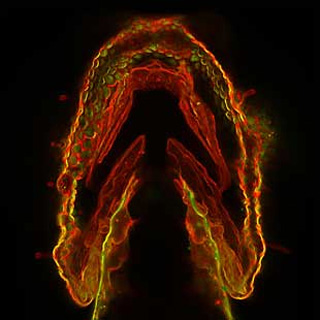
In this photograph of a three-day-old zebrafish jaw, glycan patterns are labeled in red, green, and yellow, helping researchers to study how organisms develop, and identify markers for disease. See Lecture Summary 3 to learn more about imaging glycan patterns in developing embryos. (Image by Carolyn Bertozzi, University of California, Berkeley, NIGMS Image Gallery.)
Instructor(s)
Dr. Julie M Silverman
Dr. Maria Walvoort
MIT Course Number
7.342
As Taught In
Fall 2014
Level
Undergraduate
Course Description
Course Description
Glycans, which are complex assemblies of sugars, are the most prevalent class of macromolecules, surpassing nucleic acids, proteins and lipids. Glycans are essential for life, as they are a required energy source, provide protection against cellular stresses and shape cellular structure. During this course, we will explore the many roles glycans play in human health and disease. For example, we will learn about the healthy glycosylation patterns of many mammalian proteins and the dynamic changes that glycan structures undergo during early development and cancer metastasis, the influence of dietary carbohydrates on glycan metabolism, and the role of densely glycosylated proteins involved in HIV infectivity. Concurrently, we will learn about the chemical and biological techniques used to detect and visualize glycans by in vitro and whole-animal metabolic labeling approaches, how to profile protein-glycan interactions using high-throughput glycan arrays, and about the development of new carbohydrate-based therapeutics and vaccines to target HIV, influenza and bacterial pathogens. The course will focus on the primary research literature, and we will learn practical laboratory techniques, experimental design and how to interpret data and critique the conclusions offered by authors.
This course is one of many Advanced Undergraduate Seminars offered by the Biology Department at MIT. These seminars are tailored for students with an interest in using primary research literature to discuss and learn about current biological research in a highly interactive setting. Many instructors of the Advanced Undergraduate Seminars are postdoctoral scientists with a strong interest in teaching.


